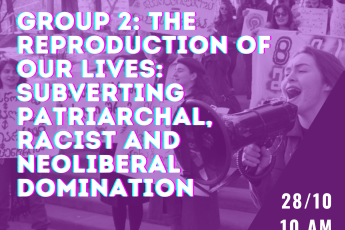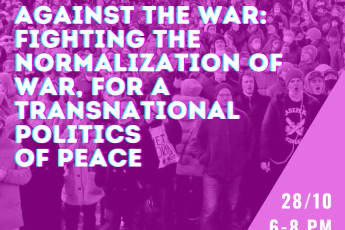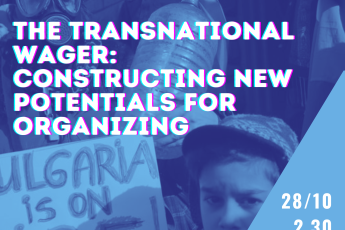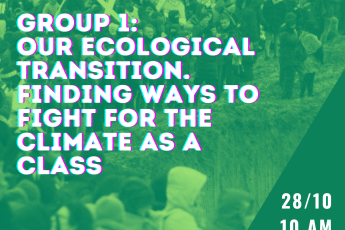[German below]
The “Workers for and against climate” workshop was very rich in terms of examples of specific conditions and activities of workers and workers’ struggles, so it’s a pity that these notes cannot capture all of them. We’ve heard more about the complex dynamics between traditional workers demands and climate (justice)/green politics from Germany, Poland, Georgia, USA, Belgium, Bulgaria, and Bosnia and Herzegovina. However, do feel free to suggest your contribution for the second issue of the Climate-Class Conflict Journal and tell more!
Participants went through many different dimensions of the problematic. Due to the calls for pragmatic usefulness contributions are here categorized in two lines, two terms that seemed to dominate the conversation (like key words/phrases): 1) the (political) strike and 2) the trade union.
(1)The (political) strike
A political strike is a workers’ strike where demands do not directly concern the working conditions in a given enterprise, but general societal matters – a seemingly productive clarification from the German jurisprudence.
Demand radical reduction in working hours – it would give time for feminist struggles and activism as a whole, but is also a proven way to help reduce harm on the environment. (an element of degrowth)
Help overcome the compulsion to work at least on the level of ideology, material compulsion is clear. (another element of degrowth)
Taking part in transnational campaigns helps build relationships with and among workers struggles even when they’re not specifically aimed at climate change.
In a similar vain, it’s important to identify global demands and connect them to local ones, inject them into local workers struggles, and work for the formulation and pursuing of joint demands.
The Lützerath example shows that it is possible to organize life in a community without compulsion (and money).
(2)The trade union – getting it onboard with the climate
Realize that there are different people and tendencies in every union, on every level of it. Do your homework, learn your context well and find adequate ways to approach unions at their different levels, how to approach different people there. Identify the more progressive people or units and connect with them exclusively.
Help unions along their different struggles, establish connections during specific battles, create partnerships.
Try to include/infiltrate climate activists/climate conscious comrades within the ranks of unions’ organizations.
If you’re certain that nothing (would) work(s), build our own union(s).
Things we need/have to discuss and act upon further:
The way some parts of Europe (like B&H) are being excluded for the detriment of all because they are not EU, despite the obvious reasons to unite; ways to include non-EU comrades urgently needed.
It’s important to introduce the politics of care into the climate struggle more clearly – create communities of care, that are also spaces for grief for what is being lost and build strength upon this grief.
The EU green transition policies – more specific effects and more/other specific ways to counter.
Call for text for the next issue of climate class conflict journal!
In April, the Climate Class Conflict group at the Transnational Social Strike platform aims to publish the second issue of its journal. Inspired by the discussions at the Platform’s meeting in Frankfurt in early February, we would like, as in the first edition, to continue exploring even further the dimensions and experiences of strike action as a means of reconciliation and mutual reinforcement of class and climate struggles across Europe and beyond. We also recognise that in recent weeks and months the green transition agenda has encountered a number of difficulties in the face of concrete protest and strike actions – we would like to explore and promote this invaluable experience.
Get your piece in the next issue of the Climate Class Conflict journal! Some sample topics and guidelines include:
(1)What are the specific practices, limitations and possibilities of strike action as a political tool in the struggle for a just energy transition and a decent life for workers in your country?
(2)Are there recent experiences – positive or otherwise – to talk about in your country?
(3)What is the role of trade unions in your country as far as the ruptures and links between class and climate struggles are concerned?
– You can propose recent texts that have not been published in English before, as well as new ones;
– You can send a query, an abstract or directly submit your proposal in its finished form;
– The length of texts should preferably be limited to 3/4 pages.
Send your questions and submissions to info@transnational-strike.info by the end of March.
***
Bericht WS3 – Arbeiter*innen für und gegen das Klima
Der Workshop “Arbeiter*innen für und gegen das Klima” war sehr reich an Beispielen für spezifische Bedingungen und Aktivitäten von Arbeiter*innen und Arbeitskämpfen, so dass es schade ist, dass dieser Bericht nicht alle davon aufzählen kann. Wir haben aus Deutschland, Polen, Georgien, den USA, Belgien, Bulgarien und Bosnien und Herzegowina mehr über die komplexe Dynamik zwischen traditionellen Arbeitnehmer*innenforderungen und Klima(gerechtigkeit)/grüner Politik gehört. Ihr könnt jedoch gerne euren Beitrag für die zweite Ausgabe des Climate Class Conflict-Journals vorschlagen und mehr erzählen!
Die Teilnehmenden gingen viele verschiedene Dimensionen der Problematik durch. Aufgrund der Forderung nach pragmatischer Nützlichkeit werden die Beiträge hier in zwei Linien kategorisiert, zwei Begriffe, die das Gespräch zu dominieren schienen (wie Schlüsselwörter/Phrasen): 1) der (politische) Streik und 2) die Gewerkschaft.
(1) Der (politische) Streik
Ein politischer Streik ist ein Arbeiter*innenstreik, bei dem die Forderungen nicht direkt die Arbeitsbedingungen in einem bestimmten Unternehmen betreffen, sondern allgemeine gesellschaftliche Angelegenheiten – eine scheinbar produktive Klarstellung aus der deutschen Rechtsprechung.
Fordert radikale Arbeitszeitverkürzung – das würde Zeit für feministische Kämpfe und Aktivismus insgesamt schaffen, ist aber auch ein probates Mittel, um die Umweltbelastung zu reduzieren. (ein Element von Degrowth)
Helft dabei, den Zwang zur Arbeit zu überwinden, zumindest auf der Ebene der Ideologie, der materielle Zwang ist klar. (ein weiteres Element von Degrowth)
Die Teilnahme an transnationalen Kampagnen trägt dazu bei, Beziehungen zu und zwischen den Kämpfen der Arbeiter*innen aufzubauen, auch wenn sie nicht speziell auf den Klimawandel ausgerichtet sind.
In ähnlicher Weise ist es wichtig, globale Forderungen zu identifizieren und sie mit lokalen Forderungen zu verbinden, sie in lokale Arbeitskämpfe einzubringen und sich für die Formulierung und Verfolgung gemeinsamer Forderungen einzusetzen.
Das Beispiel Lützerath zeigt, dass es möglich ist, das Leben in einer Gemeinde ohne Zwang (und Geld) zu organisieren.
(2) Die Gewerkschaft – sie beim Klima mit ins Boot holen
Macht euch klar, dass es in jeder Gewerkschaft, auf jeder Ebene, unterschiedliche Menschen und Tendenzen gibt. Macht eure Hausaufgaben, lernt euren Kontext gut kennen und findet geeignete Wege, um die Gewerkschaften auf ihren verschiedenen Ebenen anzusprechen, wie ihr die verschiedenen Personen dort ansprechen könnt. Ermittelt die progressiveren Personen oder Einheiten und nehmt ausschließlich mit ihnen Kontakt auf.
Unterstützt die Gewerkschaften in ihren verschiedenen Kämpfen, stellt während bestimmter Kämpfe Verbindungen her, schafft Partnerschaften.
Versucht, Klimaaktivist*innen/klimabewusste Genoss*innen in die Reihen der Gewerkschaftsorganisationen einzubeziehen/einzuschleusen.
Wenn ihr sicher seid, dass nichts funktioniert, baut unsere eigene(n) Gewerkschaft(en) auf.
Dinge, über die wir weiter diskutieren und handeln müssen/können:
Die Art und Weise, wie einige Teile Europas (wie Bosnien und Herzegowina) zum Nachteil aller ausgeschlossen werden, weil sie nicht der EU angehören, trotz der offensichtlichen Gründe, sich zu vereinigen; Wege zur Einbeziehung von Nicht-EU-Genoss*innen sind dringend erforderlich.
Es ist wichtig, die Politik der Fürsorge deutlicher in den Klimakampf einzubringen – Gemeinschaften der Fürsorge zu schaffen, die auch Räume der Trauer über das, was verloren geht, sind und aus dieser Trauer Kraft aufbauen.
Die EU-Politik der Green Transition – spezifischere Auswirkungen und spezifischere/andere Möglichkeiten, dagegen anzugehen.





